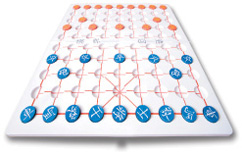|
An award winning design project involving the ancient game of Chinese chess is helping to improve the leisure, social and cultural life of visually impaired people (VIP) in Hong Kong and internationally.
In collaboration with the Hong Kong Blind Union and several NGOs, the School of Design of The Hong Kong Polytechnic University (PolyU) has successfully designed a VIP Chinese Chess set with a universal concept. "The Chess set represents a big step forward in the integration of vision impaired people into the cultural life of Hong Kong and elsewhere," said PolyU School of Design Professor Michael Siu Kin-wai, who led the project.
The VIP Chess set features a new tactile system, which enhances and motivates VIP's with different visual challenges to communicate and interact with each other. "People with different capabilities, including the visually impaired, the blind, and fully sighted people can enjoy playing chess together," added the Professor. He said the research and design work conveys the important message that no matter what type of capabilities or disabilities they may have, people can still play Chinese chess together.
"The results are tangible. Working closely with end users is a rewarding experience. Not only were we able to achieve something meaningful, we were also able to gain a better understanding of the wider challenges that affect visually impaired people" explains Professor Siu, who expects the Chess set to receive commercial backing in the near future.
In addition to functional factors such as conventional settings and the rules of Chinese chess, ergonomics and cost, the project team also considered the psychological, social and cultural factors incorporated in the research and design process. "We want to promote greater public awareness of the challenges faced by visually impaired people," said the Professor. Before embarking on the project, researchers and designers underwent simulated experience of blindness.
 |
| Chinese Chess for Visually Impaired People. |
|
|
|
Throughout the three-year research period, researchers adopted a "participatory design" approach. This involved making detailed observations to establish how VIP play chess and communicate with others. Using a participatory design approach allowed VIP to express what they actually needed, preferred and expected. The Professor believes that only through user-participation, will high quality inventions be generated and assured and real benefits brought to VIP.
For example, it was essential for design researchers to monitor finger, hand and body movements to learn how VIP communicate with each other. The result is a game that helps VIP distinguish different chess pieces; search, read, locate, move and pick up pieces and read pieces from different directions without any confusion. Packaging was also another important factor. The chess set also fits into a self-contained plastic box featuring recesses that serve as the playing board.
In the international arena, the VIP Chess Set has won several invention and design awards, including the Best Invention Awards (Overseas) and several grand awards in the Malaysia ITEX 2008, and two grand awards in the Geneva Expo 2008. The chess set has also been considered as the official standard for blind people participating in national Chinese chess competitions.
The research and design project has also provided the motivation to carry out additional in-depth applied research with action, participatory and inclusive approaches involving disabled people. "This type of research can help to bring about a more inclusive and harmonious society. We hope our work will help to arouse public awareness, understanding and respect for the needs and ways of practices of VIP regarding their daily lives," said Professor Siu.
Professor Michael Siu Kin-wai
School of Design
The Hong Kong Polytechnic University
m.siu@polyu.edu.hk |
|